Common Northern California Ants
Ants are a nuisance and can be destructive to your home environment. The following is a list of the seven most common ants found in Northern California.
The Argentine Ant
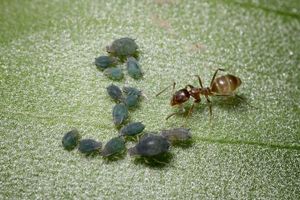
Argentine Ant
California’s most popular household ant is the Argentine Ant. The Argentine Ant invades your property and destroys beneficial native ant colonies.
These ants capture honeydew-producing pests like mealybugs, aphids and white flies. They rely on their secretions – honeydew – as their primary food source.
The Carpenter Ant
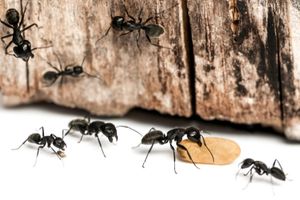
Carpenter Ants
Because it is one of North America’s largest ant species, the Carpenter Ant can be easily identified.
Carpenter Ants are large, black and burrow into wood to make their nests. They leave behind fine piles of wood pulp.
Carpenter Ants can cause serious damage to wooden houses.
The Thief Ant
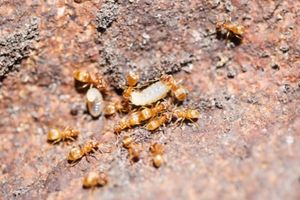
Thief Ants
The Thief Ant, a tiny ant that is light brown to yellowish in appearance, was named after it snatched the larvae from other ant species.
These ants are small but have a stinger. It can be quite painful when used.
They are attracted to greasy foods in your home.
The Pavement Ant
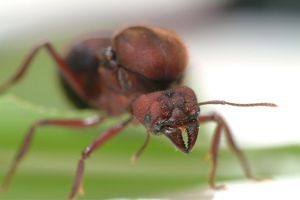
Pavement Ant
The Pavement Ant is dark brown or black in color.
It builds its nest under sidewalks, large rocks and makes flats.
These ants have a stinger that allows them to eat sweet and greasy foods.
They will eat any food that is available.
The Odorous House Ant
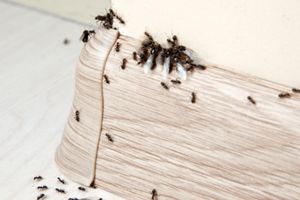
Odorous House Ants
The Odorous House Ant can be brown or black and may vary in length from an eighth of an inch to a quarter of an inch.
They can build nests almost anywhere.
When crushed, these ants emit a strong odor.
The Pharaoh Ant
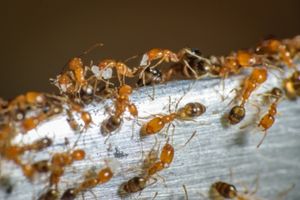
Pharaoh Ants
The Pharaoh Ant has a light yellow to reddish brown color and a darker abdomen.
The stinger is non-functional and is used to generate pheromones, which are how the ants communicate with one another.
They can chew through silk, rayon, rubber, and other materials, making them a nuisance.
The Red Imported Fire Ant
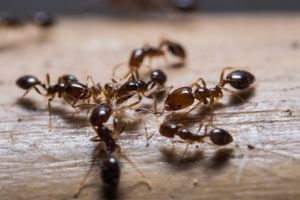
Imported Red Fire Ants
California’s Red Imported Fire Ant is now more common. Female fire ants are yellowish-brown to red. The males, however, are entirely black.
These ants can be extremely aggressive and can cause painful stings. They can also attack and kill small animals that step on their mounds. They spread their colonies quickly and kill other ant species. Their aggressive mound-building can also cause damage to crops and root systems.
Treatment of Ant Infestations
Although a minor ant infestation can be treated temporarily with an insecticide (like Ortho Home Defense) from Amazon or your local home improvement store, this small ant infestation itself may well be just the beginning.
Where you find scout ants out searching for food, you can bet there's a large colony nearby. It’s best to leave treatment for ant infestations to professional pest control services exterminators. Call or click below...or use our contact page.
Simply call or click to let us take a look...
For the fastest response
Use this form anytime...
FAQs about Ant Infestation and Treatment
Q: What are the signs of an ant infestation in my home?
A: Look for ants in large numbers, trails, small piles of sawdust or dirt, and damaged food packages. You may also find their nests, which can be in walls, under floors, or in the soil near your home.
Q: Why are ants infesting my home and how do they get inside?
A: Ants are attracted to food sources and seek shelter from the outdoors. They can enter through small openings around doors, windows, pipes, or cracks in the foundation. They are especially attracted to sweet or greasy foods, so proper food storage and cleanliness are important.
Q: How can I prevent ant infestations in my home?
A: To prevent ant infestations, seal any cracks and crevices in your home, keep food in airtight containers, clean up spills and crumbs promptly, fix leaks or moisture issues, and store firewood or other debris away from your home.
Q: What are the most effective methods for treating an ant infestation?
A: The most effective methods for treating an ant infestation include using baits, insecticides, and non-toxic treatments like diatomaceous earth. It is important to identify the ant species for targeted treatment, and consider professional help if infestations persist or are severe.
Q: Are DIY ant treatments safe and effective, or should I hire a professional ant exterminator?
A: DIY ant treatments can be effective for minor infestations, but proper application and safety precautions are necessary. If infestations are severe or persist despite DIY efforts, hiring a professional exterminator is recommended for more efficient and long-lasting results.